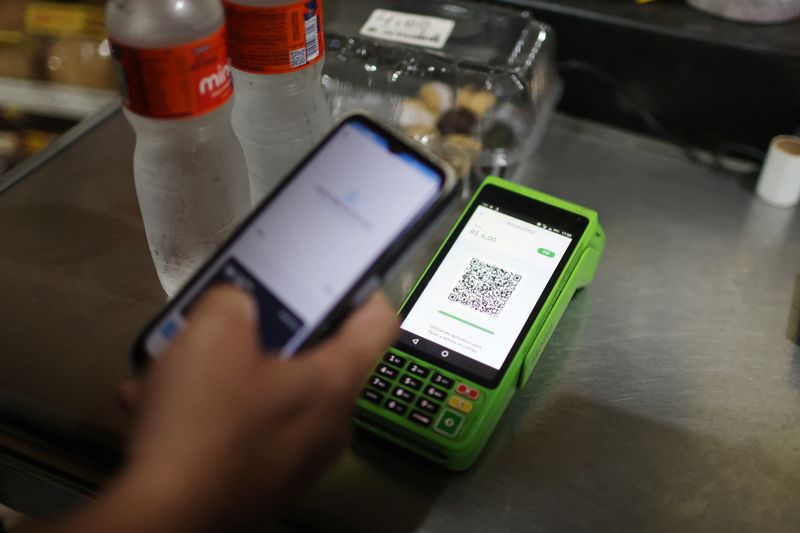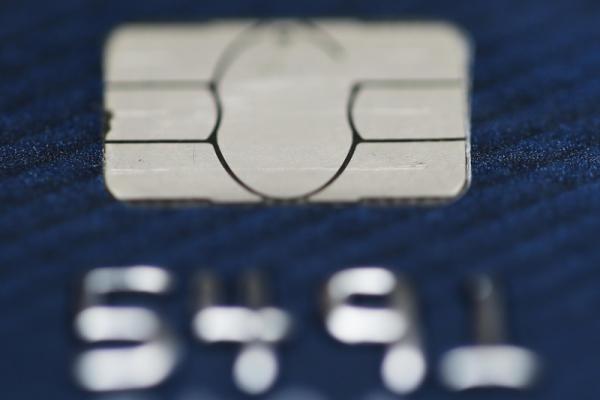By Marcela Ayres
BRASILIA (Reuters) - In just three years, Brazil's hugely popular Pix payment system has become the country's favorite way to pay, replacing cash and wire transfers in many cases and now threatening the dominance of credit cards in the booming e-commerce sector.
The instant payments designed by Brazil's central bank are a boon to online retailers, helping with cash flow in a sector with tight margins, while undercutting the legacy business of banks and fintechs built on existing credit card infrastructure.
"I think credit cards will cease to exist at some point soon," central bank chief Roberto Campos said nearly two years ago, discussing the potential for open finance and the Pix platform. "This system eliminates the need to have a credit card."
Market trends have since added weight to his forecast.
Use of Pix surged 74% last year to nearly 42 billion payments across the Brazilian economy — surpassing credit and debit card charges combined by about 23%, according to central bank data and industry group Abecs.
For buyers, the switch to Pix has been nearly seamless, as they simply scan a QR code with any banking app instead of reaching for their wallet. But for sellers, it has turned the tables on the traditionally lucrative card payments industry.
In online retail, orders paid with Pix surged 22 percentage points in two years to about a third of all purchases in December, according to e-commerce research firm Neotrust. Credit card orders slipped 5 percentage points to 51% in the period.
That trend is likely to pick up as the central bank teases new Pix innovations starting this year such as recurring payments and purchases in installments, which one official said is likely to boost the system's role in retail.
Although Brazilian consumers rarely notice, paying with a debit or credit card requires sellers to pay discount fees divided between card networks such as Visa (NYSE:V), Mastercard (NYSE:MA) and American Express (NYSE:AXP); payment processors such as Cielo, Rede, Stone, Getnet and PagBank, as well as card issuers, which are typically banks.
By removing intermediaries, Pix is putting pressure on the card networks, which receive no cut of such transactions, and payment processors, which pocket a much smaller slice than they get for credit or debit card purchases.
Pix costs an average 0.22% of each transaction for retailers, whereas debit card fees run over 1% and credit card fees can reach 2.2% of each sale in Brazil, according to a Bank of International Settlements (BIS) paper.
The growth of Pix "can limit the use of credit cards and pre-payment volumes," Goldman Sachs told clients in a note. Analysts noted that the extra fees for early payment of credit card sales contribute meaningful revenue to payment processors Stone (49%), PagBank (34%) and Cielo (9%).
Those companies declined to comment.
Major players in Brazil's credit card industry are shifting their approach as storm clouds gather.
Cielo's controlling shareholders Banco do Brasil and Bradesco announced in February their plans to take it private, a path already taken in 2022 by rival Getnet, owned by Spanish bank Santander (BME:SAN).
Two sources familiar with the operation told Reuters, on condition of anonymity, that going private gives leeway to offer a bundle of integrated products, becoming less reliant on the traditional business of connecting retailers to credit cards.
"BB and Bradesco opted to carry out Cielo's public offering as a way to make the company's governance more aligned with the new configuration of the sector," Banco do Brasil said in response to questions, adding that the industry had become more competitive amid recent "transformations."
Bradesco declined to comment.
"Pix has been and will continue to be the most disruptive technology in the financial segment in the country for the next few years," said Eduardo Lopes, public policy director at Nubank, Latin America's largest digital bank.
Nubank launched in Brazil a decade ago, offering one product: an iconic purple credit card without fees — but it has now diversified into a range of other segments, including an embrace of Pix seen at several leading banks and fintechs.
The lender ended the fourth quarter with 13.6 million customers using Pix on credit, which lets customers borrow for Pix transfers up to their Nubank credit card limit. Customers using it grew 166% from a year before.
Berkshire Hathaway (NYSE:BRKa), the investment firm of U.S. billionaire Warren Buffett, which has a 2% stake in Nubank, said in February it had totally divested its position in Stone.
NEW FEATURES PENDING
Brazil's central bank launched the Pix protocol in November 2020, mandating banks to integrate their accounts with instant digital transfers that are free for individuals. Users embraced the alternative to cash and slow, costly wire transfers.
A range of payment apps from PayPal (NASDAQ:PYPL) to Venmo have sprung up globally, but none carry the weight of a central bank owning, operating and regulating the system to guarantee speed, efficiency and universal integration with banks from day one.
That allowed the central bank to develop the protocol for less than 14 million reais and impose the adoption costs on banks, while assuring them the benefits of a more agile and inclusive financial system.
The success of Pix in Brazil, which moved more than 17 trillion reais ($3.4 trillion) in 2023, has quickly expanded into payments between people and business (P2B).
The central bank estimates P2B payments have grown from 5% of Pix transactions at launch to 38% in March — a conservative figure given how many small and informal businesses accept payments to an owner's personal account.
Although Pix does not offer the standard fraud protections on credit card purchases, its broad reach and lower transaction costs for sellers have helped to make it the preferred payment system for many retailers.
"Pix is definitely a game-changer," said Carlos Mauad, CEO of Fintech Magalu, the financial arm of retail group Magalu, which processes its own Pix transfers to cut costs and offer discounts to customers choosing the payment method.
Now the central bank is preparing to roll out new features boosting the appeal of Pix for P2B use, according to Mayara Yano, senior advisor to the Pix management and operations department at the central bank.
The first, Pix Automatico, allows for the automatic payment of recurring bills and has been scheduled for launch in October.
It could take the place of the ubiquitous bank invoices used for tuition, utilities and phone bills — and may also supplant credit cards used for media subscriptions and online services.
An even bigger impact could come from a new feature, called Pix Garantido, allowing for payments in monthly installments — a major perk of credit cards for Brazilian consumers.
Those changes are likely to accelerate the rise of Pix, which is now dictating the payment landscape in Brazil, said Carlos Netto, CEO of Matera, a tech firm helping companies integrate with the new payment platform.

"It is setting the standards for a digital finance revolution, representing the most concrete threat to credit cards," he said.
($1 = 5.0675 reais)
